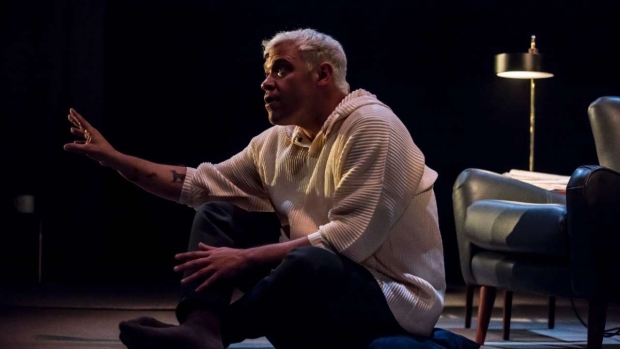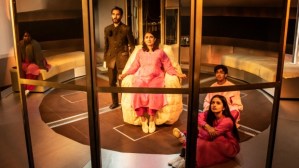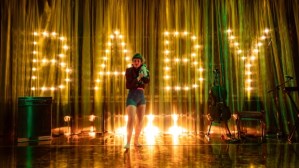”Song from Far Away” with Will Young review – a melodic meditation on loss

© Chris Payne
“Far away” is the operative phrase of many, if not all, of Simon Stephens’ plays. He draws physical or emotional distance between his characters – from each other or some truth they pursue. They’re coloured by his admission that he writes in an attempt, in part, to complete the interruption of his father’s death.
The interruption here – in his 2015 monologue, co-written by Mark Eitzel – is to a New York hedge manager’s sales meeting, with the news of his brother’s death. Summoned home for the funeral, Will Young’s Willem goes as far as to call it “an inconvenience”. But we see through this ruefully glib self-diversion away from the feelings buried inside the clump of letters he clutches and slowly shares with us.
The revelation tears through and fragments Ingrid Hu’s initially simple set. Wall panels shift and curtains split, splintering as the shape of Willem’s world changes. The foreground is clean and minimalist – a nondescript blur of the airport lounge, hotel lobby and room he’s shunted between in his dazed state of limbo.
Jane Lalljee’s warm lighting, which could be daybreak or sunset afterglow, diffuses through curtains that, silently in the background, separate and come back together again. They tower up to the ceiling, with Young dwarfed by them and the black gulf opening out of them at the back of the stage, minnowed by the magnitude of grief.
The strength of his solo performance, which entrances us for 80 minutes, is as a man trying determinedly to hold those fraying seams together and stabilise the dislocation. He uses few vocal modulations, gliding over these memories and events so as not to let them take hold and swallow him up.
He occasionally paces through lines and images without enough pauses to let them fully sink in. And his affected, slightly effete American accent is a little too unrelentingly snooty; we don’t see that hardened exterior fracture and crumble as much as it could. But its barbed edge perfectly captures the resentment and bitterness, with flashes of outright anger, that comes from being left behind.
Stephens and Eitzel also show the grief response of railing against disruption to the rhythm of life. Willem tries to medicate himself with the familiar sounds of urban hubbub: the “chorus of rattling trams”, the “humming” of a plane, the sound of his breathing. But they’re
cut through by a wistful melody heard in a bar, which he tries to apprehend, as though it’s his brother, in haunting snatches of song.
It reflects the way grief causes our senses to reanalyse the slightest suggestion as evidence of that loved one’s presence. As does Hu’s equally transfixing design. The white particles that drift down behind him could be snow or ash. Smoke creates both a clouding fog and, when he calls out to his brother, wisps that actually seem to wrap around him.
It’s a beautifully composed production about the irony of how a family’s loss can yoke them closer together, even while exposing the faultlines that drove them apart.














